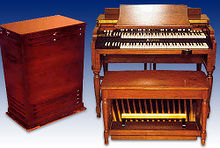
Back Tasteninstrument ALS آلة مفاتيح Arabic الة كيبورد ARZ Клавирен инструмент Bulgarian চাবিফলক বাদ্যযন্ত্র Bengali/Bangla Klavier (benveg-seniñ) Breton Instrument de teclat Catalan ئامێری تەختەکلیل CKB Klávesový nástroj Czech Tasteinstrument Danish



A keyboard instrument is a musical instrument played using a keyboard, a row of levers that are pressed by the fingers. The most common of these are the piano, organ, and various electronic keyboards, including synthesizers and digital pianos. Other keyboard instruments include celestas, which are struck idiophones operated by a keyboard, and carillons, which are usually housed in bell towers or belfries of churches or municipal buildings.[1]
Today, the term keyboard often refers to keyboard-style synthesizers and arrangers as well as work-stations. These keyboards typically work by translating the physical act of pressing keys into electrical signals that produce sound. Under the fingers of a sensitive performer, the keyboard may also be used to control dynamics, phrasing, shading, articulation, and other elements of expression—depending on the design and inherent capabilities of the instrument.[1] Modern keyboards, especially digital ones, can simulate a wide range of sounds beyond traditional piano tones, thanks to advanced sound synthesis techniques and digital sampling technology.
Another important use of the word keyboard is in historical musicology, where it means an instrument whose identity cannot be firmly established. Particularly in the 18th century, the harpsichord, the clavichord, and the early piano competed, and the same piece might be played on more than one. Hence, in a phrase such as "Mozart excelled as a keyboard player", the word keyboard is typically all-inclusive.
The term keyboard classifies instruments based on how the performer plays the instrument, and not on how the sound is produced. Categories of keyboard instruments include the following families (of which this is only a partial list):
- aerophones (pipe organ, pump organ, accordion);
- idiophones (celesta, carillon, glasschord);
- chordophones:
- electrophones (electric pianos, electric and electronic organs, synthesizers, mellotron).
- ^ a b Kelzenberg, David. "What are Historical Keyboard Instruments?". Archived from the original on 2013-02-12. Retrieved 2012-10-25.